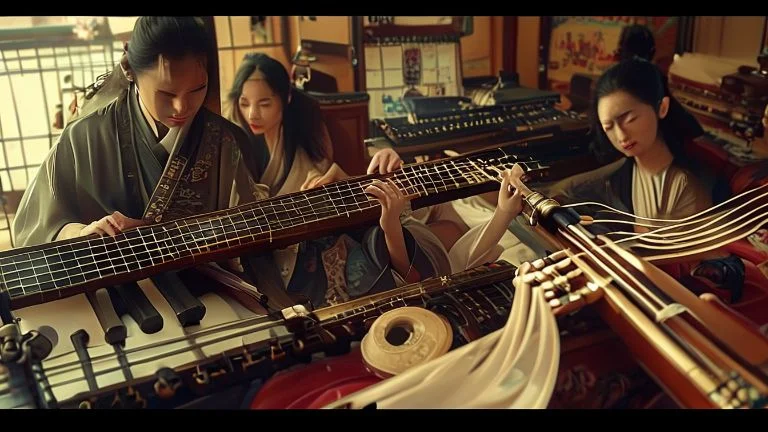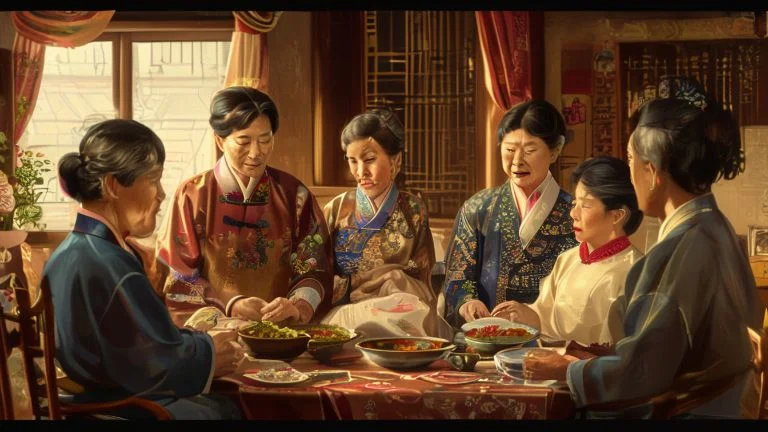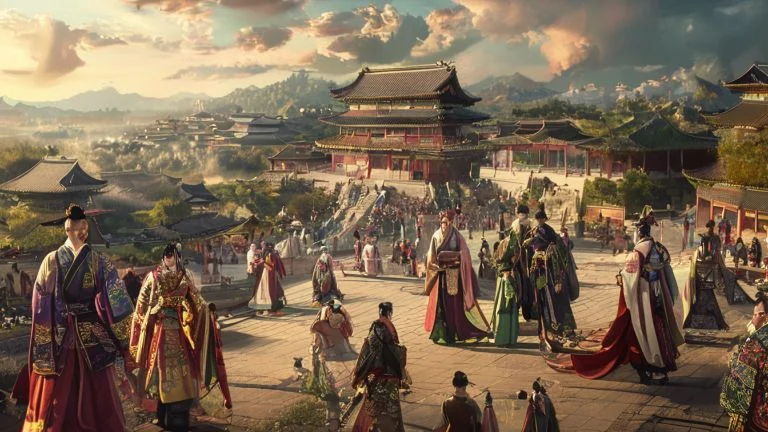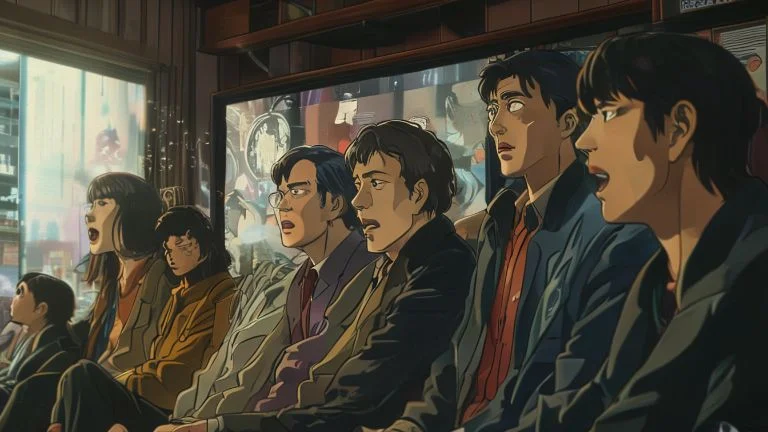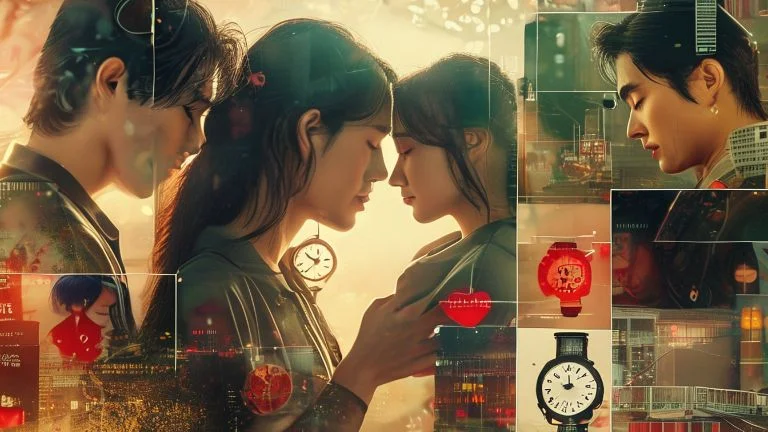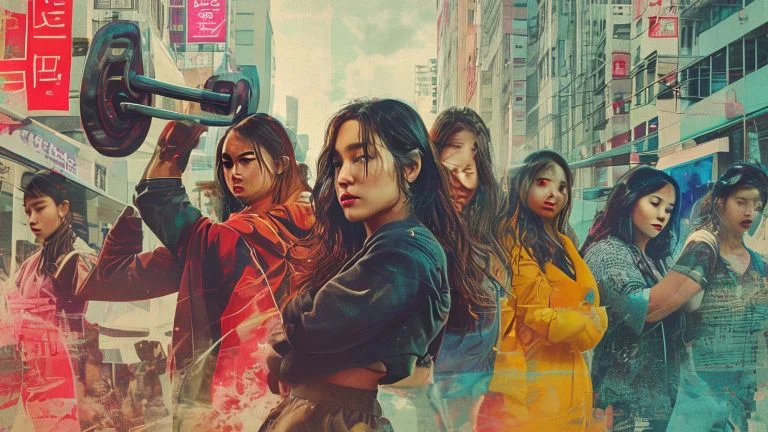The Evolution and Cultural Significance of Supernatural Themes in Asian Doramas
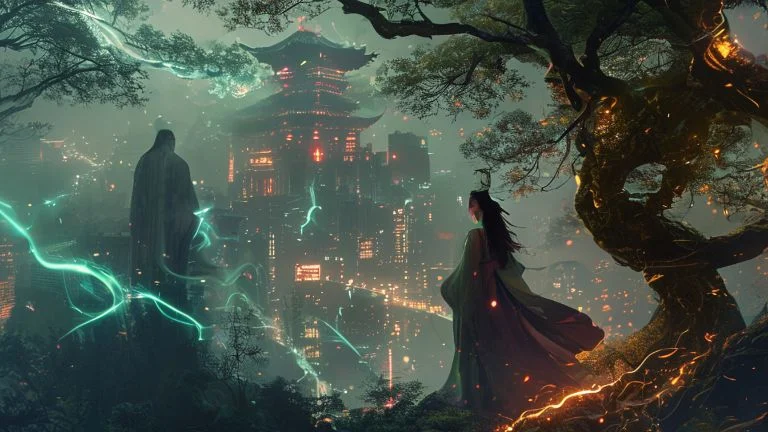
Asian doramas, or TV dramas, have seen an increasingly prominent rise in the use of supernatural themes over the past two decades. This evolution reflects broader social, economic, and cultural transformations within various Asian societies, making such themes resonate powerfully with contemporary audiences. Traditionally, Asian storytelling was deeply rooted in folklore, mythology, and religious beliefs, which naturally encompassed supernatural elements such as deities, spirits, ghosts, and mythical creatures. These elements have been reinterpreted to fit modern narratives, blending genres such as romance, thriller, historical, and fantasy, creating rich, multidimensional storytelling that captivates viewers. Crucially, supernatural motifs do not merely add aesthetic or entertainment value but often function as metaphors for societal anxieties, identity struggles, and spiritual explorations.
In Japanese doramas, for example, there has been a steady increase in the integration of yokai (supernatural creatures from Japanese folklore), spirits, and the afterlife in storylines. Shows like "Natsume's Book of Friends" (Natsume Yuujinchou) explore the coexistence of humans and supernatural beings, emphasizing themes of isolation and understanding. Similarly, Korean dramas (K-dramas) have embraced supernatural themes in forms ranging from ghost stories to reincarnation and fantasy romance. Titles such as "Guardian: The Lonely and Great God" (Goblin) have garnered massive international popularity, blending fantasy with emotional human drama. This growth is not limited to Japan and Korea; Chinese dramas (C-dramas) have also reflected a significant increase in the popularity of xianxia (fantasy based on Chinese mythology, Taoism, and martial arts), bringing ancient supernatural lore into modern television narratives.
This surge points not only to creative exploration but reveals an intersection between the historical richness of supernatural folklore and contemporary storytelling demands. Asian doramas use supernatural themes to highlight human emotions, cultural identity, and universal questions about life and death while adapting to the tastes of a global audience. Understanding why and how supernatural themes have risen requires examining each cultural context, industry dynamics, audience engagement, and the implications for the future of Asian television drama.
Historical Roots and Modern Adaptations of Supernatural Elements in Asian Doramas
The origin of supernatural components in Asian media can be traced to centuries-old oral traditions and classical literature filled with tales of spirits, demons, immortals, and mythical beings. In China, classical texts such as "Strange Stories from a Chinese Studio" (Liaozhai Zhiyi) introduced supernatural phenomena as central storytelling devices. Such narratives foreshadow contemporary supernatural elements seen in Chinese dramas, though modern installments have expanded beyond traditional tales to incorporate complex characterizations and plotlines involving gods, immortality quests, and mystical powers. This deep cultural heritage provides fertile ground for modern producers and writers eager to amalgamate traditional symbolism with contemporary societal concerns and entertainment trends.
In Japan, the Edo period fostered a surge in ghost stories and supernatural literature. Kabuki theater, ukiyo-e woodblock prints, and countless folktales popularized yokai and other spectral beings whose stories often embodied moral lessons or explored the mysteries of the human psyche. The transition to television and modern media preserved these motifs albeit in reformulated ways that deliver a mix of horror, mystery, and sometimes comedy or romance. Modern J-doramas often portray supernatural beings in sympathetic or relatable ways, allowing viewers to explore themes of loneliness, acceptance, and the unseen depths of the human experience through the lens of fantasy.
Korean traditions also hold a rich tapestry of supernatural beliefs involving ghosts (gwishin), shamanism, and folklore. Historically, Korean shamanistic rituals aimed at communicating with spirits and healing were popular, which later influenced narrative arts including literature and performance. These traditions permeate K-dramas that utilize supernatural elements for narrative tension, emotional depth, and symbolic meaning. Furthermore, the rise of fantasy romance centered on reincarnation and immortal beings reflects evolving audience preferences for emotionally charged storytelling with otherworldly stakes.
These historical backgrounds are crucial for understanding why supernatural themes tend to be deeply entrenched in Asian doramas. They lend emotional weight and narrative complexity that transcends mere entertainment. Modern adaptations frequently combine these age-old concepts with advanced special effects, contemporary dialogues, and innovative plot structures, making the supernatural accessible and engaging for younger viewers and international audiences alike.
Industry Dynamics Fueling the Growth of Supernatural Themes
The entertainment industries across Asia have witnessed significant shifts that facilitate and encourage the incorporation of supernatural themes in doramas. Technological advancements in visual effects make it possible to render supernatural phenomena in a visually compelling manner, far beyond practical or stage effects used in previous decades. High-quality CGI, animation integration, and sophisticated cinematography techniques enable creators to depict mythical creatures, ghosts, spirits, and magical realms credibly, significantly enhancing viewer immersion.
Moreover, the global expansion of Asian television content, propelled by streaming services such as Netflix, Viki, iQIYI, and Viu, has encouraged production houses to pursue genres with broad international appeal. Supernatural themes easily transcend linguistic and cultural barriers by tapping into universal human experiences including mortality, love, fear, and hope. This universal appeal prompts investment into genre diversification, making supernatural doramas a lucrative arena for both local and international revenue streams.
Production companies also adapt to shifting demographic profiles and audience preferences. Younger viewers increasingly seek innovative, genre-blending content that offers escapism as well as meaningful narratives. The supernatural genre accommodates these demands by offering flexible frameworks to incorporate romance, action, comedy, horror, and thriller elements within one cohesive story arc. The willingness of creators to experiment with cross-cultural folklore and mythologies also enriches the storytelling palette, ensuring consistent novelty and surprise.
Furthermore, the competitive environment in Asian television promotes differentiation strategies where supernatural themes serve as a distinctive hallmark for certain series or production studios. Successful examples often inspire a wave of similar content, creating an upward spiral in thematic prominence. This trend also intersects with the rise of Asian popular culture globally, where supernatural doramas become ambassadors for cultural export, embodying traditional values reimagined through modern creativity.
Character Archetypes and Narrative Structures in Supernatural Doramas
Supernatural doramas commonly feature recurring character archetypes and narrative patterns that connect audiences with familiar yet intriguing motifs. Protagonists often include reincarnated souls, immortals seeking redemption, ghosts with unfinished business, or humans endowed with supernatural abilities. These characters are typically portrayed with emotional complexity, allowing exploration of identity, morality, and existential dilemmas.
A common narrative structure involves the intersection between the human world and the supernatural realm, creating conflict or harmony. Stories often revolve around a human protagonist's encounter with a supernatural being leading to transformative experiences, such as love, healing, or self-discovery. This dynamic enables rich character development and emotional depth, carefully balancing fantastical elements with relatable human concerns.
For example, in the Korean drama "Goblin," the immortal goblin character longs for a human bride to end his curse-imbued immortality, intertwining fantasy with themes of fate, love, and sacrifice. Japanese doramas might explore human-spirit relationships highlighting coexistence and understanding, such as in "Natsume's Book of Friends." Chinese xianxia dramas feature heroes cultivating spiritual powers through rigorous training, facing mythical foes, and embroiled in cosmic battles, reflecting a fusion of action and fantasy.
The following table summarizes common character archetypes and their narrative roles within supernatural Asian doramas:
| Archetype | Description | Common Narrative Role | Examples |
|---|---|---|---|
| The Immortal | Being cursed or blessed with eternal life | Seeks redemption or release | Goblin (Korean), The Untamed (Chinese) |
| The Spirit/ Ghost | Deceased entities with unfinished business | Guides or haunts the living | Natsume's Book of Friends (Japanese), Master's Sun (Korean) |
| The Reincarnated | Souls reborn into new lives | Recovers memories and resolves past conflicts | Moon Lovers: Scarlet Heart Ryeo (Korean), Eternal Love (Chinese) |
| The Cultivator/ Sorcerer | Practitioner of spiritual/magical arts | Fights evil forces, protects balance | The Untamed (Chinese), Brave Ghost Story (Japanese) |
| The Human with Powers | Humans granted supernatural abilities | Struggles with dual identity and purpose | You're Beautiful (Korean), My Love from the Star (Korean) |
Creators skillfully combine these archetypes with thematic elements to craft intricate plotlines. The balance between tragedy and hope, conflict and resolution, reality and fantasy is a hallmark of the genre. This multiplicity enriches storytelling and deepens viewer engagement.
Audience Reception and the Psychological Appeal of Supernatural Themes
The rising popularity of supernatural doramas is tied closely to the psychological and emotional appeal such stories hold for viewers. The presence of supernatural elements allows an imaginative escape from mundane routines while simultaneously touching on universal existential concerns. Audiences find comfort in narratives where unseen forces influence fate, where past lives affect present circumstances, or where love can transcend mortal boundaries.
These stories often provoke curiosity about life after death, spiritual realms, and metaphysical questions, providing subtle guidance for grappling with anxieties around death, loss, and meaning. Supernatural themes offer catharsis through symbolic storytelling, enabling reflection on personal challenges indirectly. Viewers also appreciate the exploration of morality and justice manifested through supernatural interventions, whether as karmic consequences or cosmic balance.
Young people, in particular, respond to the complex layers of identity exploration, emotional intensity, and the blending of myth with personal struggle. The supernatural genre provides a flexible framework that easily integrates romance, friendship, and family dynamics, which appeals broadly across age groups. Additionally, the high production value and visual spectacle characteristic of supernatural doramas enhance immersion, making them a favored choice within an increasingly competitive entertainment landscape.
The following list outlines key psychological appeals driving audience engagement with supernatural-themed doramas:
- Exploration of spiritual and metaphysical questions in a narrative form
- Emotional catharsis through depictions of loss, love, and redemption
- Identification with characters facing dual realities or identity challenges
- Escapism offered by otherworldly settings and fantastical plots
- Aesthetic pleasure from high-quality visual effects and imaginative worlds
- Curiosity about cultural myths and folklore presented in modern contexts
- Community building through shared fandom and discussions around mystery and fantasy
Challenges and Critical Perspectives on Supernatural Doramas
While supernatural themes have enriched Asian doramas creatively and commercially, certain challenges and critical viewpoints persist. One such challenge involves balancing authentic cultural representation with entertainment and market desires. Doramas that draw heavily from folklore must negotiate issues of cultural sensitivity and avoid superficial or stereotypical portrayals. Misrepresenting or commodifying spiritual beliefs risks alienating traditional audiences and distorting indigenous cultural values.
Moreover, the high expectations for visual effects and production quality can create significant financial burdens on smaller studios, potentially limiting diversity in storytelling. There is also a tendency in some series to over-rely on supernatural gimmicks without sufficient narrative depth, leading to viewer fatigue and diminishing returns. Critics sometimes point out that supernatural themes, when not handled thoughtfully, may reinforce escapism at the expense of addressing real social issues.
From a narrative perspective, formulas frequently repeat archetypes and plot devices, risking predictability. Hence, creators face the challenge of innovating within well-worn genre conventions. Maintaining the balance between mysticism and relatability is critical, as overly obscure or complex supernatural lore can alienate mainstream viewers. Furthermore, competition in this niche means that creators must constantly raise the bar in terms of storytelling and production to retain audience interest.
Despite these concerns, recent trends suggest increasing attention to narrative quality, cultural accuracy, and creative risk-taking within the genre. Collaborative projects between countries have also introduced cross-cultural perspectives, enriching supernatural themes with fresh viewpoints and cosmopolitan appeal.
The Future Trajectory of Supernatural Themes in Asian Doramas
Supernatural themes in Asian doramas show no signs of diminishing relevance or appeal. Instead, emerging trends indicate further evolution in complexity, cross-genre integration, and market reach. Increasingly, doramas combine supernatural motifs with science fiction, historical drama, and psychological thriller, expanding thematic scope and storytelling techniques. Audience demand for immersive, multilayered narratives encourages writers and producers to delve deeper into mythology, folklore, and existential themes with renewed creativity.
Technology will continue to play a significant role. Advances in virtual reality, augmented reality, and interactive storytelling may soon transform how viewers experience supernatural narratives, providing highly personalized and participatory encounters with fantasy worlds. This could redefine viewer engagement, allowing active involvement rather than passive consumption.
International collaborations between Asian countries and global producers may also bring hybridized supernatural themes, mixing diverse mythologies and narrative styles, enhancing global appeal while maintaining cultural specificity. Furthermore, fan communities and digital platforms enable robust discussions, reinterpretations, and fan-created content that expand the life and meaning of supernatural doramas beyond traditional broadcast.
On the production side, increasing accessibility to high-quality special effects technology may democratize content creation, fostering innovative indie projects with unique supernatural storytelling. Education and awareness around cultural authenticity will likely improve the respect and depth accorded to traditional beliefs depicted in contemporary series.
Below is a summarized table of potential future developments in supernatural themes within Asian doramas:
| Aspect | Current Status | Expected Developments |
|---|---|---|
| Technology & Effects | High-quality CGI, traditional filming | Integration of VR/AR, interactive experiences |
| Narrative Complexity | Genre blending, common archetypes | Deeper mythology, multi-genre fusion |
| Cultural Representation | Increasing cultural sensitivity | Cross-cultural myth blending, authentic storytelling |
| Audience Engagement | Passive viewing, fandom communities | Interactive viewing, fan-created expansions |
| Production Landscape | Major studios, streaming platforms | Indie creators, digital democratization |
In conclusion, supernatural themes in Asian doramas represent a dynamic and evolving cultural phenomenon. Their rise counts on a confluence of historical traditions, audience desires, technological progress, and creative innovation. The genre’s blend of emotional depth, mystery, and fantasy will remain a vibrant source of storytelling, reflecting and shaping contemporary cultural expressions across Asia and beyond.
FAQ - The Rise of Supernatural Themes in Asian Doramas
Why have supernatural themes become popular in Asian doramas?
Supernatural themes resonate due to their deep cultural roots, universal existential questions, and the creative flexibility they provide in storytelling. Modern production technology and global audience demand for genre-blending content also significantly contribute to their popularity.
What are common supernatural elements found in Asian doramas?
Common elements include ghosts and spirits, immortals, reincarnation, mythical creatures like yokai or dragons, spiritual powers, shamanism, and mystical realms derived from traditional folklore and mythology.
How do supernatural themes affect narrative structures in doramas?
They often introduce archetypes like immortals or spirits that intersect with human characters, creating plots centered around redemption, love, fate, and identity, allowing multi-layered storytelling blending fantasy with human emotions.
Are supernatural doramas popular outside Asia?
Yes, due to streaming platforms and universal themes, supernatural Asian doramas have gained significant international audiences, contributing to the global rise of Korean, Japanese, and Chinese television dramas.
What challenges do creators face when producing supernatural-themed doramas?
Challenges include maintaining cultural authenticity, avoiding clichés, balancing special effects with narrative depth, and managing production costs related to high-quality visual effects and complex storytelling.
Supernatural themes have surged in Asian doramas by blending rich cultural folklore with modern storytelling. This genre captivates audiences through complex characters and narratives exploring identity, spirituality, and human emotions, enhanced by advanced production techniques and international appeal.
The rise of supernatural themes in Asian doramas reflects a profound engagement with cultural heritage, audience expectations, and evolving media landscapes. These narratives intertwine ancient folklore with modern storytelling techniques, crafting stories that explore human identity, emotion, and spirituality through fantastical lenses. As technology and global interest expand, supernatural doramas will continue to innovate, deepen in complexity, and expand their cultural influence worldwide.

